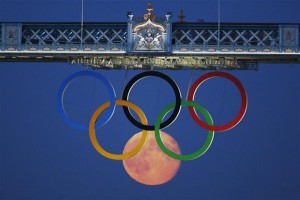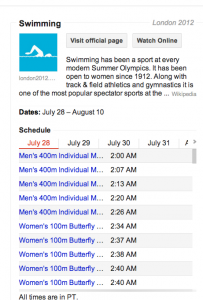The recently concluded Summer Olympics in London have been a boon for athletes in all manner of ways, from individual glory and sudden fame, which can account for marketing and advertising deals that further benefit them down the road.
The impact of the games can be seen in a quick look at Twitter numbers, both for the games overall as well as for individuals who were the most talked about and who gained new followers as a result.
Twitter has posted some interesting numbers from the 16 days of events. It said that it had 150 million tweets over that span and that the top three were Usain Bolt winning the gold in the 200m sprints at 80,000+ tweets per minute (TPM). He managed 74,000TPM winning the 100m sprint.
Local favorite Andy Murray racked up 57,000 TPM on his way to gold in men’s single tennis, while the Jamaican 4×100 relay team’s gold recorded a 41,000. It is somewhat difficult to compare the results to previous world events because Twitter often posts the amount of tweets per second, but does not give a time frame over which that number averaged. However you can look here to see some of the top events of 2011 in terms of tweets.
The height of tweeting always took place duri
ng an event, rather than at the awards ceremony, particularly when it was a spectacular individual play. The top ten athletes that garnered a minimum of 1 million tweets each were:
1) Usain Bolt
2) Michael Phelps
3) Tom Daley
4) Ryan Lochte
5) Gabby Douglas
6) Andy Murray
7) Kobe Bryant
8 ) Yohan Blake
9) Lee Chong Wei
10) LeBron James
In many ways this was to be expected but now athletes are seeing that their followings growing, and now that the Olympic ban on talking about sponsors has ended, this can only benefit the athletes.
According to market intelligence firm Fresh Egg, which tracked athletes from Great Britain some of the athletes witnessed huge growth in their followings. Tom Daley saw a net increase of 821,000 followers, a 265% increase. Jessica Ennis saw a 235% increase with the addition of 408,000 new followers. It should be noted that the increase levels off after about the top 17. Overall the Team GB went from having roughly 3 million followers’ pre-Olympics to 5.7 million post Olympics, an 88% increase.
I can only imagine the numbers in four years when the games head down to Rio. The question here is will the IOC continue its ban on athletes mentioning sponsors in their tweets and other social media uses? If not athletes will be able to point out the growth of their followings after medal wins and other notable events when they negotiate with potential sponsors and so see additional fruits from their labors.









